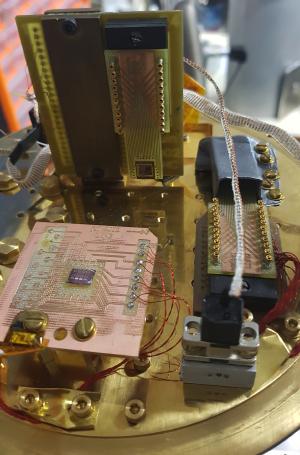Headed by
The RSFQ (Rapid Single Flux Quantum) digital superconducting electronics activity, conducted in close collaboration with several laboratories and research centres spread over 4 continents, is focused on:
- the study, design and experimental characterization of high and low critical temperature digital and analogue superconducting circuits: influence of magnetic field, temperature, THz frequency behaviour, study of new devices and principles;
- the development of demonstrators based on superconducting mixed-signal circuits for applications in space telecommunications (digital microwave analogue-to-digital converters) and in geophysics (superconducting magnetometers based on Superconducting Quantum Interference Devices (SQUIDs));
- the development of open-source software tools for the design and characterization of complex digital circuits (for digital signal processing units, microprocessors), analogue systems (including THz superconducting sensors) and mixed-signal circuits (integrated analogue-to-digital converters).
Superconducting electronics is an alternative solution based on a disruptive technology to integrate on the same chip RSFQ digital circuits that can operate at clock rates above 100 GHz, with quantum-accurate sensors such as digital SQUID magnetometers or analogue-to-digital microwave converters. Such superconducting circuits have a very high energy efficiency (gain of a factor of 50 for complex circuits, taking into account the cost of cryogenic cooling). The main applications concern space telecommunications, 5G / 6G communication systems at microwave frequencies, microprocessors for specific uses (signal processing, intensive computing with high energy efficiency), interfaces for quantum computing, sensors for geophysics and imagers in sub-THz/THz radio astronomy THz or for medicine.

of digital & analogue superconducting circuits.



